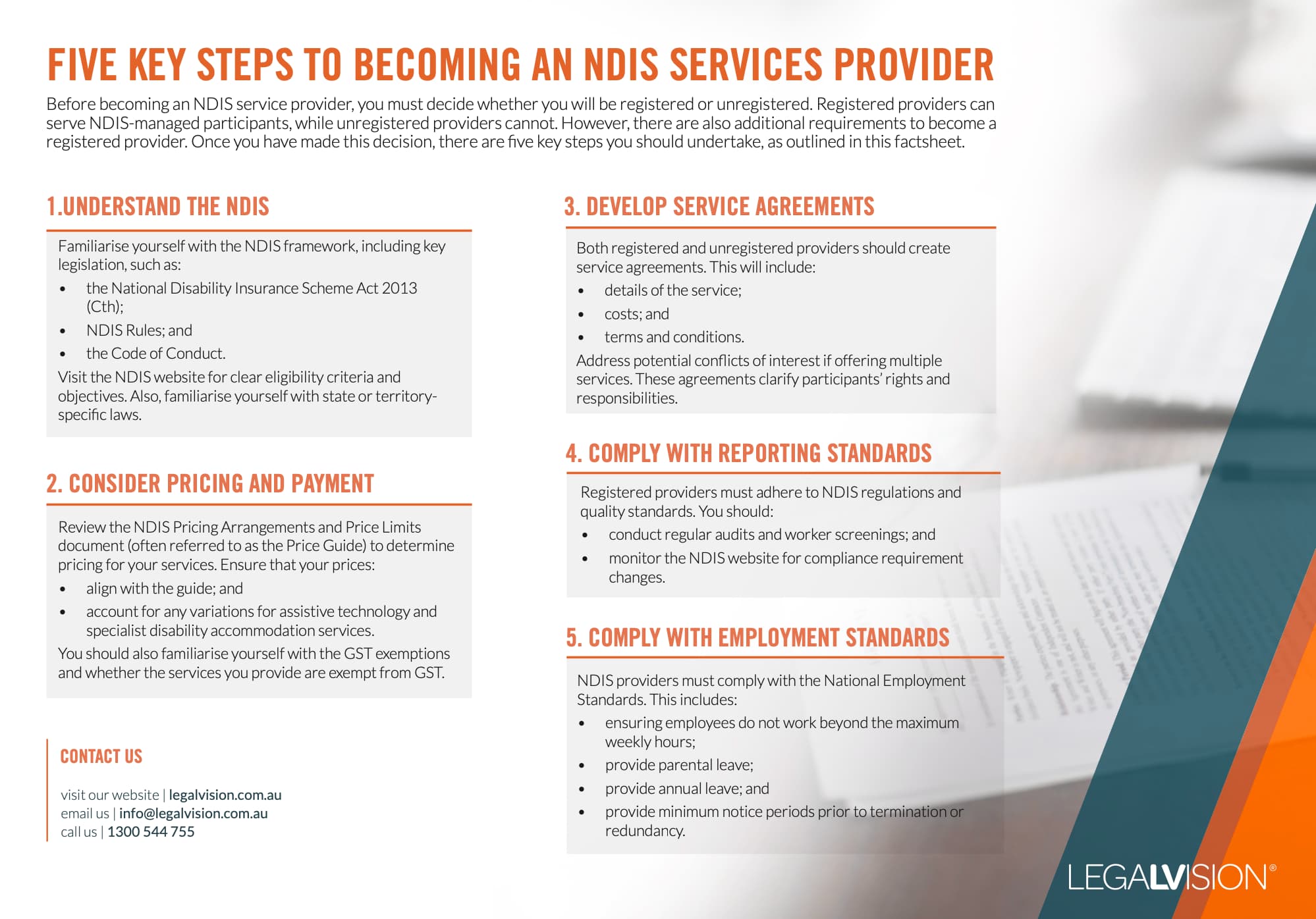In Short
- To provide Specialist Disability Accommodation (SDA), you must register with the National Disability Insurance Scheme (NDIS) and comply with specific accessibility and design standards.
- SDA properties need final certification from an Accredited SDA Assessor to ensure compliance before they can be registered.
- Providers must also manage legal documentation, enrolment processes, and maintain compliance with NDIS regulations.
Tips for Businesses
Ensure your SDA properties meet all required standards from the start, engage an Accredited SDA Assessor for certifications, and maintain clear documentation. Staying compliant with NDIS requirements is essential for successful registration and operation. Always seek professional advice to navigate complex regulations effectively.
If you want to provide specialist disability accommodation (SDA), you must be aware of your legal obligations. The NDIS regulates the provision of SDA, which involves complex regulatory elements. This article will explain some key considerations for potential providers of SDA, including understanding registration requirements and key compliance issues. It will also help ensure that your business flourishes while complying with all applicable laws.
What is SDA?
SDA refers to the physical dwelling designed to cater to people with high support requirements. The SDA provider manages the property, including collecting rent and maintaining the dwelling. To provide SDA, you must be a registered provider with the NDIS.
Since SDA is specifically about the property in which NDIS participants live, two key features of SDA are that:
- the dwelling must have accessible features to assist the participants; and
- the provider must allow a SIL provider to deliver additional support services in the home.
SIL refers to Supported Independent Living services. Unlike SDA, which attaches directly to the property. SIL focuses on the support services provided to individuals living in an SDA dwelling. These services may include assistance with daily tasks, personal care, and community participation. SIL providers do not manage the physical property but instead deliver the necessary support services to the residents.
The SIL Provider and the SDA Provider may but do not have to be, the same entity. If they are the same entity, it could give rise to a conflict of interest. In this case, it is best to chat with our team. We can assist you in managing and disclosing any potential conflict to your participants. You must obtain informed consent from the participant to protect you and the participant the best.
Is Providing SDA Right for My Business?
The final decision about whether providing SDA is right for you will always rest with you. However, a few considerations are:
- can you supply premises that will fit the required accessibility features so you can enrol the dwelling with the NDIS?;
- have you registered with the NDIS? ;
- do you have the right documents in place with participants?; and
- can you comply and ensure that all of your personnel (including any sil providers on the premises) comply with the rules and regulations of the NDIS?
We will look at each question in turn.
Continue reading this article below the formRequired Accessibility Features
To qualify as an SDA dwelling, a property must meet specific accessibility and design requirements. These requirements are outlined in the NDIS SDA Rules. There are four categories of SDA dwellings:
- robust housing;
- improved livability;
- fully accessible; and
- high physical support.
Each SDA category includes specific design standards that the building must meet during design and after construction.
At the design stage, an Accredited SDA Assessor will need to check the design plans. This is to ensure they follow the rules in the SDA Design Standard. If the assessor is happy that the design fits the standard, they will give you a Design (Provisional) Certification. The certification is named ‘Provisional’ because the dwelling has not yet been built. It is important to remember that you cannot register for a Design (Provisional) Certification with the NDIA. Only the NDIA can enrol a completed dwelling with a final certification.
After the builder finishes the dwelling, the Assessor will need to visit the property. They will check that the builder has included all the required features. The Assessor will also ensure that everything meets the SDA Design Standard. If the completed dwelling meets all the requirements, the Accredited Assessor will provide a Final-as-built Certificate of SDA Category Compliance. They will also provide you with a copy of the SDA Assessment Summary Form. These forms are essential to your enrollment with the NDIA.
Registration and Enrolment of the Dwelling
Providers must register with the NDIS Quality and Safeguards Commission to run and enrol a specialist disability accommodation (SDA) dwelling.
Each provider must also enrol each SDA property with the NDIS through the Provider Portal. Providers must create an application through the portal. They must upload mandatory enrollment documentation. This documentation includes the certificates provided by an Accredited SDA Assessor, as well as the SDA Dwelling Enrolment and Declaration form.
The NDIA will then assess your application and either approve the dwelling or send a letter outlining reasons for not approving the dwelling.
Required Documents with Participants
As a SDA provider, you may provide a SDA dwelling to a participant by either:
- owning the property and entering into a residential leasing agreement with the participant; or
- entering into a commercial lease agreement with the property owner and then subleasing the property to the participant by entering into a residential leasing agreement.
If you enter into a residential lease with the participant, you will need to ensure that the agreement complies with all applicable laws. It is also important to make your role and responsibilities clear.
If you enter into a commercial lease with a landlord, you must ensure that the lease terms allow you to operate this type of business. Additionally, you must provide the lease. This will enable you to enrol the property and sublease it to your participants.
Compliance (For You, Your Personnel and Third Parties)
For You
SDA providers must adhere to the NDIS Business Terms and SDA Rules. These documents outline property enrolment, pricing, and service delivery requirements. The SDA Rules also specify the eligibility criteria for participants to receive SDA funding. This funding is based on their functional impairment level and support needs.
For Your Personnel
You must ensure clear and compliant subcontracting agreements with those responsible for constructing the SDA dwelling. This will help ensure it meets the design standards and rules. Our team would happily assist you in drafting or reviewing such agreements.
If you are also an SIL provider, you must make sure you have other subcontracting arrangements in place. These arrangements should involve individual carers providing support. The agreements should emphasise the legal requirements. This includes ensuring that individuals are safe for participants to be around by conducting criminal history checks. They should also require carers to report any issues to you and support the choice and control of the participant.
For Your Third Parties
It is strongly recommended that the SDA and SIL providers be separate entities to avoid potential conflicts of interest. However, this is not a legal requirement. Regardless of which parties provide the SDA and SIL services, a collaboration agreement is essential. This agreement ensures seamless service delivery and clarifies roles and responsibilities.

Understand five key steps you should know to become an NDIS service provider with this free LegalVision factsheet.
Key Takeaways
Before becoming an SDA provider, you should ensure it is the right fit. As an SDA provider, you must comply with many highly regulated obligations according to the NDIS and the relevant federal and state laws. It is important to contact us. We can discuss your leasing, service agreements, and applicable state-specific requirements. This will help you best protect yourself as an SDA provider.
If you require assistance as an SDA provider, our experienced NDIS lawyers can assist you as part of our LegalVision membership. For a low monthly fee, you will have unlimited access to lawyers to answer your questions and draft and review your documents. Call us today on 1300 544 755 or visit our membership page.
Frequently Asked Questions
To provide SDA, you must register as a provider with the NDIS and ensure the property meets specific accessibility features. You must also comply with NDIS rules and have the necessary documentation and agreements with participants.
SIL focuses on delivering support services to individuals living in SDA properties, such as personal care and daily task assistance. While the SDA provider manages the property, the SIL provider focuses on support services, and they can be separate entities to avoid conflicts of interest.
We appreciate your feedback – your submission has been successfully received.












